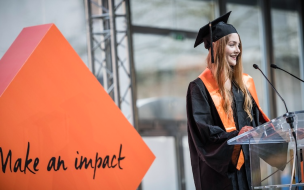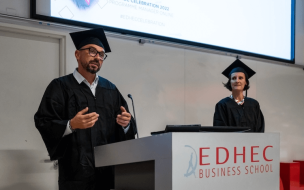Today, Mohamed works with Aqua Development, an agricultural startup launched by his older brother, which sustainably produces organic shrimp using aquatic biology and technology. The venture aims to reduce the global reliance on farmed shrimp from Asia and Latin America.
Mohamed, who recently graduated from the MBA program at EDHEC Business School, was joined at Aqua Development by Krystyna Ledochowska in 2022, a fellow EDHEC alum who developed a passion for sustainability while working in the yachting industry.
They spent six-months working together before Krystyna moved to join another sustainable startup, Allume Energy, which uses innovative technology to connect apartments with solar power.
Each having turned their passion for sustainability into careers in social entrepreneurship, BusinessBecause spoke with Mohamed and Krystyna about their journeys. They revealed these key tips on how to launch a career with a sustainable startup.
1. Consider your motivations
Sustainability is a broad umbrella covering social and governmental issues, as well as the environment. If you plan on a career in sustainable business, it’s important to consider your motivations so you can find an area that fits.
While working with luxury yachts, Krystyna became concerned with the ecological damage caused by consumption and the use of plastics. Understanding the issues that resonated with her best provided clarity when making career choices.
“Start mapping out what you think sustainability is, because everyone has different ideas,” she says.
Discovery can be an ongoing process: during her MBA, Krystyna took the opportunity to reach out to companies and individuals working in sustainable roles, who continued to shape her journey and help find the right career.
“The MBA is a time to experiment and play. You're really free for that year. So you can kind of do whatever you want, explore, and research.”
2. Show commitment to sustainability on your resume
Krystyna was inspired to pursue a career in sustainability prior to enrolling at EDHEC. But, with a bachelor’s in psychology and work experience confined to the yachting industry, finding opportunities was difficult.
“I did try to apply to a few charities and environmentally related organisations, but they’d take one look at my CV and laugh. They’d say ‘nothing on your CV tells us you care about the environment and the planet’.”
Krystyna chose to enroll in an MBA degree, feeling the generalist curriculum would provide her with a holistic understanding of business. The EDHEC program, which is ranked among the top-three worldwide for ESG and Net Zero teaching by the Financial Times, also offered a variety of opportunities to learn about sustainability.
She feels enrolling in such a program allowed her to prove her commitment to a career in sustainability and gave her a chance at recruitment after graduation.
3. Increase your sustainable business knowledge
Of course, having sustainability credentials on your resume is one thing, but it’s equally important to be able to back that up with specialist knowledge and skills.
Mohamed’s brother founded Aqua Development, but he was keen to get involved in the company and enrolled in an MBA to ensure he could bring value to the business.
As an EDHEC MBA student, Mohamed expanded his knowledge across fundamental areas of business such as finance, operations, and marketing. Alongside the core curriculum, he developed specialist expertise during various sustainability-oriented classes.
Mohamed was able to apply this knowledge to help the business both during and after his degree.
“Sustainability goes through the whole curriculum. You learn how important it is, about the specific needs, and the regulatory challenges,” he says. “I got answers from professors to help me build the business plan.”
4. Plan for a career in a particular industry or location
Like Krystyna, Mohamed chose EDHEC as a study destination because of its sustainability credentials. But it was also a strategic decision.
Europe represents one of the world’s biggest markets for shrimp, however the vast majority is imported from countries such as Vietnam and Thailand.
With Aqua Development’s aim to disrupt this market, Mohamed felt studying at a business school in France would offer a chance to develop his understanding of the market and make useful connections.
“The inspiration was that we could combine the fact that I’m transitioning my career and looking to move into this business and bring value, and at the same time it would converge with Aqua Development’s plan for implementing in Europe,” he explains.
5. Network!
The EDHEC MBA provided the connection that brought Mohamed and Krystyna together; the networking opportunities available on the program have since proved essential in boosting their careers.
For Krystyna, attending a sustainability conference in Paris connected her with representatives from Allume Energy, one of whom would later become her boss. She also developed a strong network among the EDHEC cohort that taught her the value people from different backgrounds can bring to a business.
“The MBA prepared me by collaborating with different types of working people with different backgrounds, from different industries, who think and work differently and so have different approaches to problems,” she says.
In his plan to understand the local market, Mohamed reached out to various people connected to EDHEC who worked in sustainable roles. “I was surprised how easy it was to find people for support, alumni from EDHEC who work in sustainability,” he explains.
They helped him with research, allowing him to learn local legal requirements and strategies that could be effective. Professors at the school also taught him how to show the value of the business when pitching to investors.
Today, both Mohamed and Krystyna are making an impact in their careers working within social entrepreneurship, with the EDHEC MBA providing a launchpad for success.
“When you go to a business school that has these values, you meet people that share those same values,” adds Mohamed.








